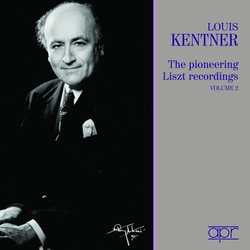


1 CD (76'35)
1. SCHUBERT/LISZT Soirée de Vienne 6 S427; recorded on 17 July 1939
LISZT Grandes Études de Paganini S141:
2. No 2 Octave recorded on 27 January 1942
3. No 3 La campanella recorded on 9 September 1946
4. No 5 La chasse recorded on 13 September 1946
5. La leggierezza S144/2; recorded on 10 July 1939
6. Gnomenreigen S145/2; recorded on 3 September 1941
7. Liebestraüme No 3 S54; recorded on 3 September 1941
8. Feux-follets S139/5 (Transcendental Etude No 5); recorded on 23 March 1937
9. Venezia e Napoli S162 Année de pèlerinage 2 supplement:
Gondoliera; Tarantella; recorded on 30 March 1938
11. R.W.-Venezia S201; recorded on 10 November 1951
12. En reve—nocturne S207; recorded on 10 November 1951
13. Czárdás macabre S224; recorded on 10 November 1951
14. MEYERBEER/LISZT Illustrations du Prophète: No 2 Les Patineurs—scherzo S414/2, recorded on 7 March 1939
Though Hungarian by birth, and having studied at the Franz Liszt Academy in Budapest, Louis Kentner, like so many others of Jewish origin, immigrated to London in the mid 1930s, aware that central Europe was not the best place to be at that time for someone of his race. He was to remain in London for the rest of his life, becoming very much part of British musical life both as pianist and, later, as teacher.
His somewhat sensational London debut took place in the Aeolian Hall in October 1936 where he gave an all Liszt recital. As a direct result he was signed up by HMV and over the next fifteen years, in addition to much other repertoire, he made a large number of Liszt recordings which featured not only the often recorded etudes and Hungarian Rhapsodies but also premiere recordings of many of Liszt's more important, but then less well known, larger works. Our first APR title (APR5514) featured such unusual works as the Scherzo & March, the Berceuse and the first Polonaise; on the current disc, in addition to a number of the well known aforementioned etudes, we find a group of late pieces, including the bizarre Czárdás Macabre, which was only published in the year of its recording, and the Meyerbeer/Liszt 'Les Patineurs' scherzo. This later piece is one of Liszt's most brilliant operatic transcriptions, but is strangely little known. It is perhaps Kentner's most stunning recording and a fitting way to end this fascinating recital.